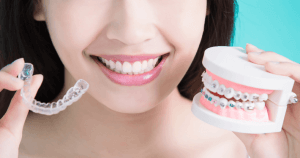Braces may help alleviate tooth grinding in the long run, but in the short term, your bruxism may actually worsen due to the temporary discomfort of teeth straightening. If this happens to you, you may need a night guard for braces.
In this article we’ll talk about:
- How to wear a night guard with braces
- Where to get night guards for braces
- Wearing a night guard after braces
We hope this information helps you protect your teeth from grinding even while you undergo orthodontic treatment!
In This Article
Braces and bruxism
Bruxism or teeth grinding, and in some cases, TMJ is when you grind your teeth together while you sleep. This is a potentially dangerous condition because it wears down your enamel, leaving your teeth vulnerable to sensitivity, pain, and decay.
Bruxism can be exacerbated by misaligned teeth, so getting braces can actually be a good step towards alleviating your grinding in the long term.
However, during orthodontic treatment, your grinding may temporarily worsen, due to the discomfort that comes during the initial stages. In this case, you may need to wear a night guard to protect your teeth.
Can you wear a night guard with braces?
Depending on the kind of braces you have, and whether they are on both arches or just the top or bottom, you may be able to wear a night guard with braces. Let’s have a look at your options.
Night guards and metal braces

If you have metal braces on just the top or bottom arch, then the solution is simple — you can wear a night guard on the arch that doesn’t have braces.
If you have braces on both arches and you suffer from severe teeth grinding, your orthodontist may be able to make you a night guard to fit over your braces.
Night guards and invisible braces
If you have invisible braces like Invisalign, you most likely won’t be able to wear a night guard, unless your orthodontist can make you one that fits over your invisible braces.
The good news is that invisible braces will protect your teeth from grinding — the bad news is that each set of your aligners could wear out before you move on to the next set.
Let your orthodontist or Invisalign dentist know if you suffer from teeth grinding so they can monitor the wear and tear on your invisible braces.
Night mouth guard for braces
You have a couple of options for night mouth guards if you have braces:

- Single-arch guard: If you only have braces on your top teeth or only on your bottom teeth, then the solution is easy — you can get a custom mouth guard for the arch that doesn’t have braces. This will protect your teeth from grinding at night, all throughout your orthodontic treatment, and thereafter.
- Orthodontic guards: If you have braces on both of your arches, you may need to opt for special orthodontic mouth guards, which we’ll talk more about below.
If you do only have braces on the top or bottom teeth, then you can order a custom-made mouth guard to start protecting your teeth from grinding now.
SportingSmiles offers quality, affordable, and custom mouth guards for both the top and bottom arches. That way you can get the protection you need without having to worry about the new alignment of your shifting teeth, and the changes you will experience when you get your wires adjusted, or attachments placed.
With SportingSmiles, you also have the option to choose from a variety of protection levels all at a low night guard cost:
- Flexible Super Hard: This is the strongest option, made to protect from severe grinding and jaw clenching
- Dual Laminate: This guard features a comfortable and soft inner lining and a hard exterior for optimal protection
- Single Hard: This extra thin, hard night guard is suitable for moderate cases of tooth grinding and jaw clenching
- Single Soft: This night guard is suitable for less severe cases. It has a soft interior and exterior for a comfortable fit
Orthodontic grinding guards
Your orthodontist may be able to fit you for a special night guard, made specifically to wear with braces.
The problem that can occur with this type of night guard is that it may need to be replaced frequently because your teeth will constantly change position during orthodontic treatment.
Additionally, braces can involve a variety of changes, like getting attachments, wire adjustments, chains, and elastics — all of which could affect the fit of your guard.
That being said, if you have braces on both your upper and lower jaws, and are a constant teeth grinder, then you should speak with your orthodontist about getting a special mouth guard to fit around your braces.
Night guard after braces
After you get your braces off, you’ll need to wear a retainer. Some retainers look quite a bit like night guards, while others have an acrylic plate and a wire.
If you have the kind that covers your teeth like a night guard, then you won’t be able to wear a night guard at the same time as you wear your retainer.
In this case, your orthodontist may recommend that after the first couple of weeks of wearing your retainer every night, you can alternate nights wearing your retainer and your grinding guard.
Your retainer will protect your teeth from grinding, but since it’s not made for that purpose, it will wear out faster. Alternating nights will help it last longer — as long as your orthodontist gives you the OK.
Conclusion
If you’re a habitual tooth grinder, your bruxism isn’t going to give you a break just because you get braces. And it’s always important to protect your teeth from the wear and tear caused by grinding.

That means that you’ll need to find the right mouth guard for your situation. If you only have braces on the top or bottom arch, then you can get a night guard for the arch that doesn’t have braces.
But if you have braces on both the top and bottom teeth, then you may need to get a special orthodontic guard that goes over your braces.
If you have invisible braces, these will provide some protection from teeth grinding, but they will also wear out faster so your orthodontist will need to monitor the resulting wear and tear.




